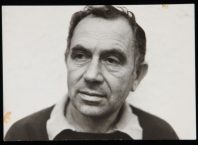“Are you Polish?” The question comes in an unexpected place: the cafeteria of Al Qasimi College in Baqa Al Gharbiya, where I am attending a writer’s conference, yet another attempt to promote dialogue between Arabs and Jews in Israel. My answer is immediate, and to me, obvious: No. I was born in Israel and raised on the stories of my mother’s childhood in the Jezreel Valley. Originally from Laschov, Poland, my grandfather Zvi Elboim, came to what was then Palestine to create a socialist egalitarian utopia. Hebrew was the only language spoken in their home. Yiddish, Polish and the cultural past they represented disappeared, more permanently than they had expected, when their family remaining in Poland was killed in WWII.
Yes, this is where the story becomes complicated, in more ways than one. Mi casa es su casa acquires an ironic twist in the Middle East, but more on that later. I have always been adamant about identifying as Israeli/American, focusing on the present, rather than the past. My cultural, religious, social and ethnic connections are in Israel and the US, not Poland. I have never been inclined to venture on one of the “roots” journeys to Europe, popular among Israelis. Nor do I feel a need to boycott Polish or German products or hate my contemporaries in those countries for the actions of their grandparents. For years I practiced a cosmopolitan indifference, based on the formative texts of my own childhood – John Lennon’s “Imagine” and stories from my grandmother Bracha’s kitchen.
Yet the Polish “invasion” of Israel in 2007 – with it’s inundation of cultural events as part of the “Polish Year” in Israel, destroyed the careful distance I had maintained. As someone who writes regularly about culture, there would be nothing casual about either writing or not writing about Polish related events during that year. I first realized this when I had complimentary tickets to a performance of Israeli playwright Hanoch Levin’s “Krum” directed by Krzysztof Warlikowski at the Cameri Theatre in Tel Aviv. The play, quite naturally, was to be performed in Polish. Friends who usually vie to accompany me to the theatre were simply not interested, saying, “Why would I want to see a play performed in Polish?” Even my mother, who is the most curious and culturally adventurous person I know, adamantly refused to accompany me.
Yes, there is a language barrier, they would have to read the Hebrew translation provided in superscripts. Somehow, that doesn’t seem to stop Israelis from seeing French films. I myself didn’t know what to expect and was so amazed and impressed by this interpretation of Levin that I tried to arrange an interview with the elusive director. That is how I found myself talking to Jacek Poniedziałek, who translated the play from Hebrew to Polish and played the lead role of Krum. There was no way to have that conversation without confronting my internal conflict regarding all things Polish, realizing that I didn’t know much about contemporary Polish theatre because I did not want to know.
It’s easy to maintain a superficially friendly attitude towards one’s fellow humans from a distance, and easy to maintain hatred as well. Distance and ignorance combined with an ideology that sounds politically correct and looks good on paper, allow hatred and prejudice to thrive under the guise of humanitarian values. It’s easy to say that I don’t hate the Poles if I never actually speak to one. War is made possible by the dehumanization of the enemy, reducing an entire country and its people to a short list of clichéd attributes. Slogans are effective tools of war; peace is never as easy, and requires that we remain open to listen.
Over the course of that year, I found myself encountering Poles and Polish culture everywhere: at the theatre, in the university, in a bar on Ben Yehuda Street long after midnight, and then writing about these encounters. I learned a lot, made many acquaintances and at least one friend with whom I continue to correspond. By the time Janusz Wiśniewski’s multi-cultural production of “Noah’s Ark” came to the Cameri, my mother not only wanted to join me, she even recognized some words in Polish, a language she had not spoken since the age of three, saying: “I think serca means heart.”
I have never visited Poland, before this past year I never had the desire to do so, even today I don’t know if I ever will. The photograph of the ruins of the synagogue in Laschov where my grandparents were married will always give me a sense of pain and loss, yet the Sephardic arches of the building itself are another reminder of the intricate tangles that compose our identity. Of what would I accuse the Poles? Racism, prejudice, aggression and violence against innocents – why would I choose to do the same by boycotting Polish culture and people? To quote the actor Shredy Jabarin, who was born in Um el Fahm, studied at Tel Aviv University and performs in many theatre and film productions, including “Noah’s Ark,” I too, would like to “explore, learn about myself and others.”
Boycotting Israel is quite popular these days. Artists scheduled to perform in Israel are pressured on all sides to cancel. Elvis Costello and the Pixies have cancelled, Joan Armatrading performed in Israel last weekend, and Elton John is still on for June 17, 2010, and the internet debate is ongoing and fierce.
As much as I would like to see a peaceful resolution of the Israeli-Palestinian conflict, I cannot believe that a policy of exclusion and shutting down communication and cultural exchange with Israel can lead to anything but a perpetuation of ignorance and hatred. There cannot be peace without dialogue and any action that blocks dialogue is but another obstacle on the path towards peace. There are Israelis who support a cultural boycott on Israel; some of them are even my friends (at least on facebook). Friends or not, whether we agree or disagree, at least we should be able to talk about it.
AYELET DEKEL






This is exactly what is needed: an intensive cultural exchange. Especially now as Poland opens up to Jews and Israel, also politically. And especially because before WWII Jews in Poland was an enormously vibrant society: politically, culturally on many many aspects of creative activity, and religiously as well. Once you dive into this story, you will be shocked. During the first years of Israel, a large share of Knesset parlamentarians … spoke or at least understood Polish. Warm greetings from Warshe 🙂
Comments are closed.